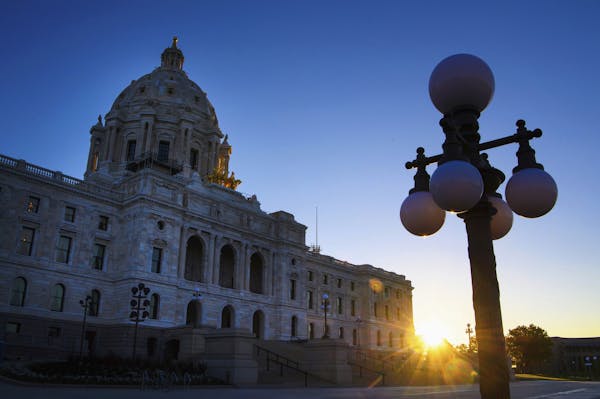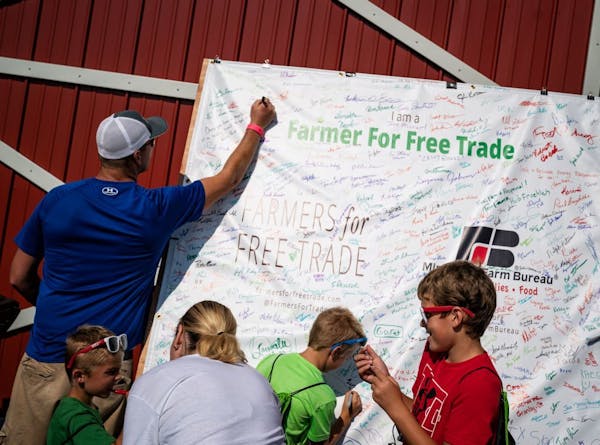MORGAN, Minn. – The five major candidates for Minnesota governor chased support from rural voters on Wednesday, promising to partner with farmers and the food industry as they made their first and only joint appearance ahead of next week's primary election.
Clear differences on issues like taxes and regulations emerged between the three DFLers and two Republicans who shared the stage at the Farmfest agricultural expo. But the candidates — state Rep. Erin Murphy, Attorney General Lori Swanson and U.S. Rep. Tim Walz of the DFL; and Republican former Gov. Tim Pawlenty and Hennepin County Commissioner Jeff Johnson — rarely directly engaged with one another.
"We're going to bring people into the government who respect the industry, work with industry and listen and hear so that we're all accomplishing our common goals," said Swanson, in a remark that typified the deference both sides offered to agricultural interests.
The candidates all pledged solidarity with farmers on issues like biofuels, a yearslong trend of low commodity prices and the consequences of President Donald Trump's tariffs on foreign goods, which has boomeranged on soybean producers slapped with tariffs from China, an important buyer.
Despite a 21 percent reduction in the number of Minnesota farms during the past three decades, the proud tiller of the soil remains an iconic figure in Minnesota's politics.
And the industry remains an important economic sector in greater Minnesota, where Republicans have dominated in recent election cycles.
Meanwhile, though "farmer" still makes up one-third of the Democratic-Farmer-Labor Party's title, many in the DFL have been trying to staunch the flow of rural support toward Republicans.
Walz has made this appeal to rural Minnesota a centerpiece of his pitch to DFL voters. He represents a southern Minnesota district that includes Rochester and Mankato — but also many small towns and rural communities.
Walz touted his role in three separate federal farm bills, which provide farmers with important financial assistance. "Working with you to get results," he told the crowd.
Pawlenty, a Republican who was governor from 2003 to 2011, told the farmers they can trust him because he's been there for them in the past.
"The unquestioned champion of renewable fuels as the governor of a state in the modern history of the country is talking to you," Pawlenty said, referring to himself. "No one has surpassed a commitment and drive to help greater Minnesota and rural America with those kinds of approaches than me."
Walz and Pawlenty, though from different parties, both have more experience with contemporary agriculture policy than their three rivals. They came off as the most comfortable at Farmfest, despite the midday heat. At one point they yukked it up in a private exchange while Murphy was talking.
Murphy, the DFL-endorsed candidate, hit on an issue of particular concern to farmers: property taxes. She attacked Pawlenty for cutting local government aid when he was governor, forcing many small communities to either cut spending or raise property taxes.
"I won't do that," Murphy pledged.
Johnson brought his small-government message to the farmers.
"We take too much money from people in this state," he said, rattling off a litany of taxes that make Minnesota one of the top 10 highest taxed states in the nation.
Johnson railed against regulations intended to improve water quality, which has been a major priority of Gov. Mark Dayton.
The Minnesota Pollution Control Agency warned residents about swimming or fishing in lakes and rivers in wide swaths of the state, especially in the agriculturally intensive southern region.
Johnson, joined by Pawlenty, attacked a water quality measure — championed by Dayton and approved by a Republican-controlled House — that requires buffer strips to protect waterways from farm pollutants.
"We're going to treat our farmers as partners rather than adversaries," Pawlenty said.
Even DFLers showed little love for the buffer proposal. Both Walz and Swanson said farmers should have been more involved in the process of crafting the bill.
The chasm between the two parties was most evident during a health care discussion.
Walz and Murphy want to give Minnesotans the option of buying into the public insurance program called MinnesotaCare, while Johnson and Pawlenty want residents to be able to buy cheap coverage that only covers certain ailments. Swanson, who joined the race in June, has thus far offered little in the way of specifics about her own health care views, other than proposing a program in use in other states that helps residents receive discounts on prescriptions drugs.
Tim Braun, who farms corn, soybeans and beef cattle in North Mankato, is undecided in the governor's race; he said he sees both sides of many issues. He voted for Trump and Walz in 2016, and is unsure who he'll support in Tuesday's primary. He said he may go with Walz — but he may vote for Pawlenty.
"They're all good candidates," he said.
As for Dayton's water quality rules: "They did push it down our throats," said Braun, who also serves on his local soil and water conservation district.
On the other hand, as a sportsman, he wants conservation and protection of wildlife and habitat. "It's a good thing," he said of the effort to clean the water.
And though Braun is unhappy with the trade war and what it means for his finances, he's sanguine about it: "It will all work out."
J. Patrick Coolican • 651-925-5042


